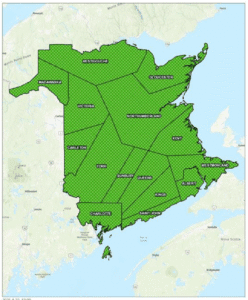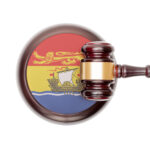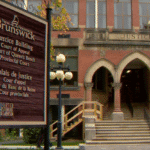New Brunswick Premier Susan Holt announces $162 million tariff action plan
With the U.S. instituting a 25 per cent tariff on Canadian goods as of midnight March 4, New Brunswick Premier Susan Holt called the act, triggered by U.S. President Donald Trump, “illegal and unjustified.”
During a provincial news conference in Fredericton on Tuesday, Holt vowed her government would “do what it takes to protect our economy and ensure we come out the other side of this storm stronger and more resilient.”
In New Brunswick, nearly 92 per cent of all exports go to the United States. Holt called the economic action a “turning point for our province and our country.” She announced that U.S. alcohol would be removed from the shelves of NB Liquor, and that the province would stop signing procurement contracts with U.S. companies.
Holt was joined by Luke Randall, the minister responsible for Opportunities New Brunswick (ONB), Intergovernmental Affairs Minister Jean-Claude D’Amours, and Agriculture and Fisheries Minister Pat Finnigan when she announced a $162 million tariff action plan.
The province’s tariff action plan includes a $50 million ONB working capital loan fund (existing), a $40 million ONB competitiveness fund, and other initiatives.

The province also announced the removal of nine inter-provincial trade barriers, with one adjusted, with six others expected to be withdrawn soon. These include no province-to-province trade barriers for alcohol, reducing regulatory burdens for truckers, and recognising employment credentials between provinces.
The plan is a cross-government effort that aims to ensure that residents and businesses have the programs and tools they need to be resilient during this uncertain time.
The four-pillar plan includes:
· Support to New Brunswickers: A flexible labour market support program delivered through Working NB and the Department of Post-Secondary Education, Training and Labour that will provide support and services to those whose jobs have been affected by the tariffs. A contingency fund will also be available through the Regional Development Corporation to support impacted communities.
· Relief for New Brunswick businesses: Working capital loans of up to $5 million providing financial support to help maintain operations; a new $40 million competitiveness and growth program to enhance the long-term sustainability of New Brunswick’s large export-intensive companies; and $4 million to support the New Brunswick Fisheries Fund – recognizing that seafood producers will be among the hardest hit. Opportunities NB will also leverage its existing $30 million strategic assistance budget in response to current challenges, help mitigate the impact of tariffs, support contingency planning, market diversification, and productivity improvements.
· Breaking down interprovincial trade barriers: Aggressive moves on labour mobility, such as automatically recognizing certified workers from another jurisdiction for a minimum of 120 days; allowing them to work while obtaining any necessary provincial credentials; removing nine, narrowing one, and considering six other party-specific exceptions under the Canadian Free Trade Agreement; participating in direct-to-consumer sales of alcohol and eliminating personal exemptions limits for alcohol; and improving internal trade promotion through a Team Canada approach.
· Promotion of the “NB Made” campaign: The New Brunswick Made campaign provides tools for people to identify items made in the province. It supports existing initiatives, such as Savour NB, Excellence NB, Eat Local NB and Buy Local for Good.
Premier Holt was blunt when asked whether Vestcor Investments would be required to divest of investments in U.S. companies like Tesla and whether the NB Power energy agreement providing power to Maine would be cancelled.
“Everything is on the table now,” she said, adding that Maine was a friend and that these agreements and investments could be impacted in the future.
New Brunswick businesses with questions about tariffs can contact Opportunities NB’s Business Navigators by calling 1-833-799-7966 or emailing nav@navnb.ca. Individuals impacted by the tariffs are encouraged to contact WorkingNB to learn more about the support measures available to them.
If the tariffs are removed, the federal government has said it will launch 25 percent reciprocating levies against $155 billion dollars on American goods, starting with tariffs on $30 billion in goods starting immediately, with the other $125 billion starting in 21 days.
Across the border, CNN reports that US stocks tanked Tuesday morning after tariffs were imposed on Canada and Mexico. Andrew Wilson, the deputy secretary-general of the International Chamber of Commerce, told the Wall Street Journal that the hefty tariffs imposed by the Trump administration could ‘crash’ the global economy, similar to the Great Depression.
“Our deep concern is that this could be the start of a downward spiral that puts us in 1930s trade-war territory,” Wilson said.














